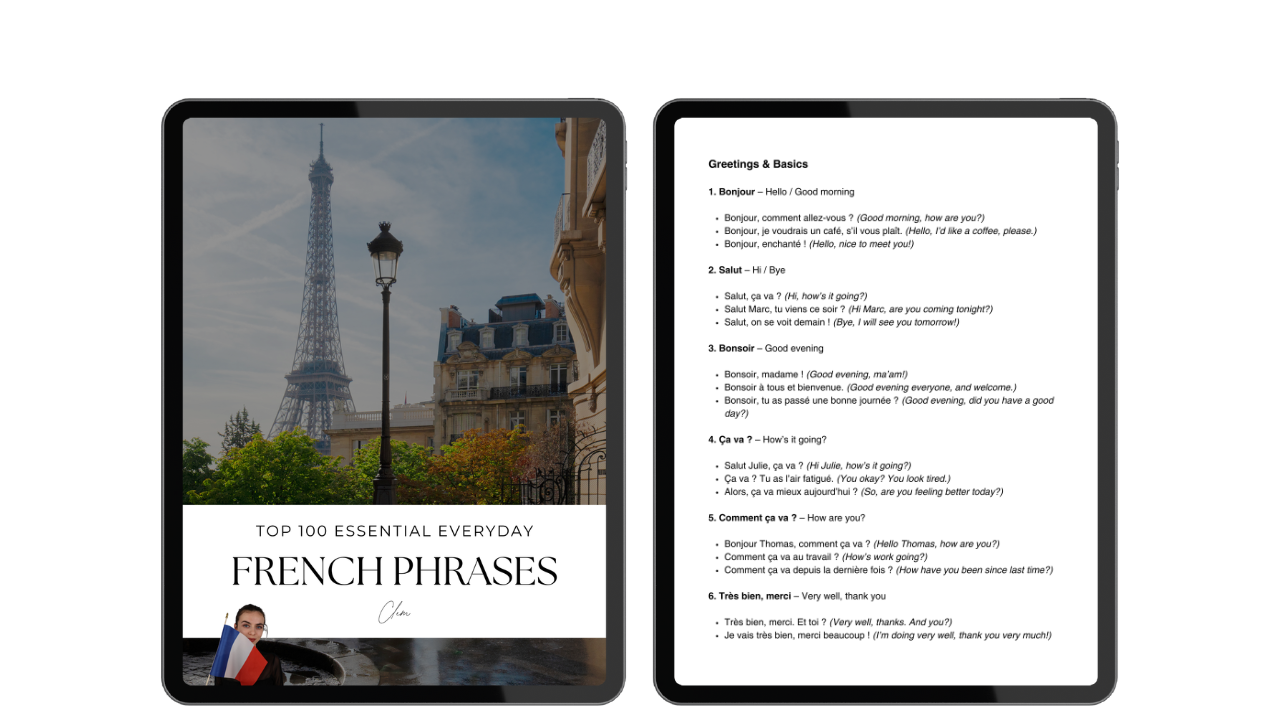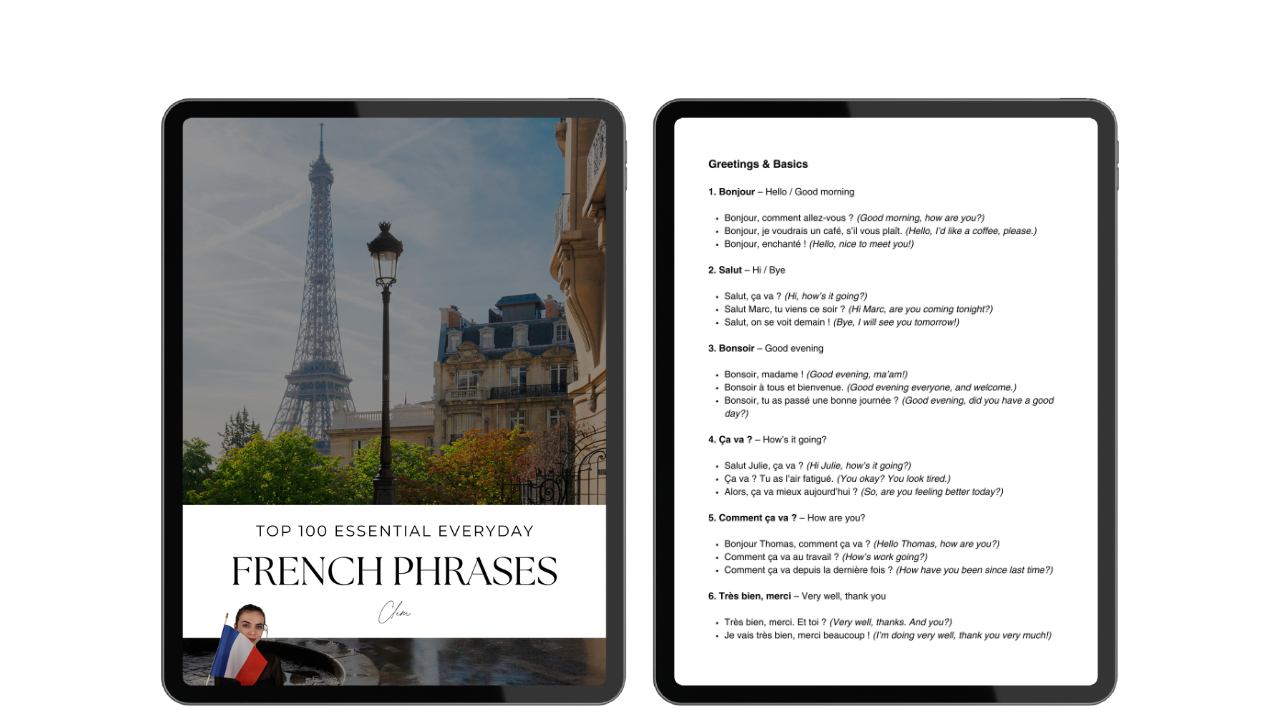
The Funniest Mistakes French Learners Have Made (And Learned From)
Nov 16, 2025If you’ve ever tried learning French, you’ve probably had at least one of those moments — you say something with full confidence, everyone bursts out laughing, and you realize (too late) that you’ve said something completely different from what you meant.
Don’t worry — we’ve all been there. French can be tricky, sneaky, and, honestly, pretty hilarious when words sound innocent in English but mean something entirely different in French.
Today, we’re diving into the funniest (and most common) mistakes French learners make — the ones that cause laughter, mild embarrassment, and eventually… progress. Because every mistake is a story, and every story is a step toward sounding more like a native speaker.
Why French Mistakes Can Be So Funny (and So Educational)
Let’s be honest: French is full of traps. Words that sound the same but mean opposite things, polite phrases that turn accidentally flirtatious, and grammar rules that can change the meaning completely just by flipping a letter.
But here’s the good news — laughter helps you remember. When something makes you cringe (or giggle), your brain locks it in. That’s why these funny moments often turn into powerful memory anchors.
Plus, French people love when you try. They won’t judge — they’ll usually smile, correct you gently, and maybe even share a story about how they once said something equally ridiculous in English.
So let’s celebrate the chaos. Here are the funniest (and most educational) mistakes French learners have made — maybe even ones you’ve already made yourself.
1. “Je suis chaud(e)” — The Classic Temperature Trap
If you want to say “I’m hot” because you’re warm, you might think “Je suis chaud(e)” works.
It doesn’t.
In French, “Je suis chaud(e)” actually means “I’m horny.”
So unless you’re trying to make your French conversation very awkward very quickly, don’t say that to your host on a summer day.
The correct phrase is:
👉 “J’ai chaud.”
Literally: “I have heat.”
In French, feelings and physical states often use avoir (to have) instead of être (to be). So you say “J’ai faim” (I’m hungry), “J’ai soif” (I’m thirsty), and “J’ai chaud” (I’m hot).
Lesson learned: French uses avoir for many physical sensations. Using être can completely change your meaning… and not always in your favor.
2. “Je suis plein(e)” — Not “I’m full,” but “I’m pregnant (like an animal)”
You’ve just finished a big meal in Paris. The waiter asks if you want dessert, and you proudly say:
👉 “Non merci, je suis plein(e).”
Well, congratulations — you’ve just announced that you’re pregnant.
“Plein(e)” literally means “full,” but when used for people, it implies pregnancy (and often in a crude or animal-like sense).
The correct phrase?
👉 “J’ai trop mangé.” — “I’ve eaten too much.”
or
👉 “Je n’ai plus faim.” — “I’m not hungry anymore.”
Lesson learned: Never translate directly from English. French often has its own logic and idiomatic ways of saying even the simplest things.
3. “Je suis excité(e)” — A Dangerous False Friend
This is a big one.
You might want to say you’re excited for your trip to France. So you say:
👉 “Je suis excité(e) d’aller à Paris !”
But… this one means something a little more adult. “Être excité(e)” usually means “sexually aroused.”
Unless you’re intentionally flirting (and good luck with that context), you probably mean:
👉 “J’ai hâte d’aller à Paris !” — “I can’t wait to go to Paris!”
This is one of those “memorize it for life” phrases — native speakers use “avoir hâte de…” all the time.
Lesson learned: English “excited” ≠ French “excité(e).” Context can turn your enthusiasm into an awkward confession.
4. “Je suis vingt ans” — You can’t “be” your age
If someone asks your age and you respond:
👉 “Je suis vingt ans.”
They’ll understand you… but they’ll laugh.
In French, you don’t “be” an age — you “have” it.
👉 “J’ai vingt ans.” — “I’m twenty.”
It feels weird at first, but again, avoir is the go-to verb for states of being that you “possess” temporarily — age, hunger, thirst, temperature.
Lesson learned: When in doubt, ask yourself — is this something I “have” or something I “am”? That one question can prevent half of these blunders.
5. “Je suis froid(e)” — You’ve just described your personality, not your body
Another temperature trap!
You’re freezing outside, so you say:
👉 “Je suis froid(e).”
That sounds right… until you realize it actually means “I’m a cold person.”
As in emotionally distant, not physically cold.
To describe how you feel, you should say:
👉 “J’ai froid.” — “I’m cold.”
(Notice the avoir pattern again!)
Lesson learned: “Je suis froid(e)” describes who you are as a person. “J’ai froid” describes how you feel. Big difference!
6. “Je veux être marié avec toi” — A grammatical slip with romantic consequences
So, you’re in love and you want to say “I want to be married to you.”
Seems simple, right? You say:
👉 “Je veux être marié avec toi.”
Technically understandable, but the proper idiomatic French is:
👉 “Je veux être marié(e) à toi.”
Because in French, you’re married to someone — not with them. The preposition matters.
Still, if you’re proposing, the grammatical details might not matter as much as the emotion — but hey, it’s good to get both right!
Lesson learned: Prepositions change everything. French often uses à where English would use with.
7. “J’ai besoin d’un préservatif” — This one does mean what you think, but it shocks people
On the other hand, if you’re at a pharmacy and say this, people will understand exactly what you mean.
👉 “I need a condom.”
So at least that one’s correct… if that’s actually what you meant.
The problem is many English speakers confuse préservatif with preservative. So when talking about food, you might accidentally say:
👉 “Les confitures ont beaucoup de préservatifs.”
That translates to: “Jams have a lot of condoms.”
Not ideal.
The correct word for preservatives in food is:
👉 “Conservateurs.”
Lesson learned: Préservatif = condom. Conservateur = preservative. One tiny letter changes everything.
8. “Je suis bonne” — Probably not what you meant either
Ah yes, the classic trap.
If you’re a woman and you say “Je suis bonne” to mean “I’m good,” prepare for some raised eyebrows.
In slang, “être bon/bonne” means “to be sexy” or “hot.”
Instead, use:
👉 “Je suis douée” — “I’m talented” (for a skill).
or
👉 “Je vais bien” — “I’m doing well.”
Lesson learned: Be careful with “bon/bonne.” It’s one of those words that can sound very different depending on tone and context.
9. “Je suis en colère avec toi” — You’re not “in anger with” someone
If you’re angry at someone, you might say “Je suis en colère avec toi.” It makes sense in English logic… but not quite in French.
The right expression is:
👉 “Je suis en colère contre toi.”
So you’re “angry against” someone, not “with” them.
It sounds stronger, but that’s the correct way to express frustration.
Lesson learned: Prepositions like avec and contre change meaning dramatically. “With” someone can sound collaborative — “against” conveys opposition.
Why French Learners Make These Mistakes (and Why That’s Good)
Here’s the truth: mistakes like these aren’t failures — they’re milestones. They show that you’re actively using the language, not just memorizing it.
The key is to laugh, learn, and keep going. When you make a funny mistake, don’t shrink from it. Write it down, tell a friend, and remember it forever. That moment of embarrassment will turn into one of your best teachers.
French learners often trip over:
- False friends (like excité, préservatif, constipé).
- Direct translations that don’t fit French grammar.
- Prepositions (à, de, avec, contre) that never align perfectly with English.
- Cultural tone — French can sound blunt, formal, or overly polite depending on context.
But once you notice the patterns, it gets easier. And yes — even natives make mistakes too (especially when they speak English!).
Turning Your Mistakes into Progress
Here’s how to make sure your funny French fails actually help you improve:
- Keep a “mistake journal.”
Write down the funny things you say or hear. Add the correct version beside it. You’ll laugh later, but you’ll also never forget them. - Ask for feedback often.
Most French people are happy to help — they love when learners are proactive and self-aware. - Repeat the correct version out loud.
Saying it fixes it in muscle memory. Don’t just think it. - Use humor as motivation.
Share your stories! The more you laugh, the more you’ll want to keep learning. - Expose yourself to authentic French.
Watch movies, podcasts, YouTube, or TikTok in French. You’ll naturally absorb idioms and pronunciation, which will reduce accidental double meanings.
Why French Is Worth the Laughs
If French didn’t occasionally make you blush or giggle, it wouldn’t be nearly as fun. Mistakes are proof that you’re experimenting, creating, and daring to speak — and that’s what learning really is.
Think about it: every fluent speaker you’ve ever met has a collection of hilarious “first-year French” stories. It’s almost a rite of passage.
So the next time you mix up poisson and poison, or say Je suis chaud(e) in the wrong setting, take a deep breath, laugh it off, and remember — you’re learning one of the most expressive, beautiful, and occasionally ridiculous languages in the world.
And one day, you’ll be the one telling new learners your own “funniest French mistake” story — in perfect French.
French will trip you up, confuse you, and sometimes make you want to hide under your couette (not couche!). But every misunderstanding brings you one step closer to mastery.
So keep practicing, keep laughing, and don’t take your mistakes too seriously — they’re the best teachers you’ll ever have.












